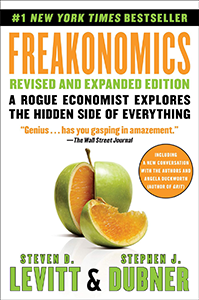Freakonomics
“Freakonomics: A Rogue Economist Explores the Hidden Side of Everything” is a non-fiction book by Steven D. Levitt, an economist, and Stephen J. Dubner, a journalist. The book uses economic principles to analyze a wide range of social phenomena, challenging conventional wisdom and uncovering surprising insights. Here’s a summary of its main ideas:
Economic Analysis of Social Issues: Levitt and Dubner apply economic thinking to unconventional topics, demonstrating how incentives, costs, and benefits shape human behavior and societal outcomes. They explore questions such as:
– What incentives drive schoolteachers to cheat on standardized tests?
– How do real estate agents maximize their profits when selling homes?
– What factors contribute to crime rates and their decline?
Incentives Matter: The authors argue that incentives play a crucial role in determining people’s decisions and behaviors. They illustrate how individuals and organizations respond to incentives in sometimes unexpected ways, leading to unintended consequences.
The Power of Data: Levitt emphasizes the importance of empirical data and statistical analysis in understanding complex social issues. He uses data-driven research to challenge conventional wisdom and uncover hidden patterns and correlations.
Unconventional Connections: “Freakonomics” explores unexpected connections between seemingly unrelated phenomena. For example, the authors examine correlations between legalized abortion and crime rates, challenging traditional views on crime prevention.
Economics as a Lens: The book encourages readers to view the world through an economic lens, where rational decision-making, incentives, and unintended consequences shape outcomes in various spheres of life, from crime to parenting.
Controversial Topics: Levitt and Dubner tackle controversial topics with a provocative and analytical approach. They encourage critical thinking and challenge readers to reconsider their assumptions about social issues and human behavior.
Applicability Beyond Economics: While rooted in economics, “Freakonomics” explores interdisciplinary connections with sociology, psychology, and other fields. It demonstrates how insights from economic analysis can shed light on broader societal issues.
Narrative Style: The book is written in a narrative style that makes complex economic concepts accessible and engaging to a general audience. Levitt and Dubner use storytelling and real-world examples to illustrate their points and captivate readers.
Impact: “Freakonomics” sparked widespread discussion and debate about the application of economic principles to everyday life. It influenced public discourse on topics ranging from education and crime to business and politics.
Overall, “Freakonomics” is a thought-provoking exploration of how economic reasoning can illuminate hidden aspects of human behavior and societal phenomena. It challenges readers to think differently about the world around them and consider the economic incentives underlying social issues and decisions.

